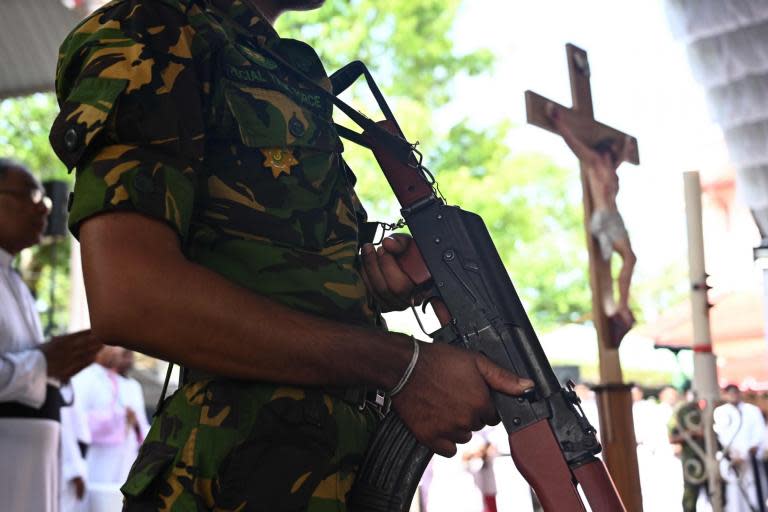Sri Lanka bombings: Security services had extensive knowledge about deadly attacks, intelligence officials say
The security services and police force in Sri Lanka had extensive knowledge about a plot to carry out attacks on churches, according to a number of international intelligence officials, before the Easter massacre claiming more than 300 lives.
The detailed information, including names and addresses of suspects, was instrumental in carrying out over 40 arrests in the past few days, with more than two dozen picked up in the immediate aftermath of the attacks. But the apparent failure of authorities to act before the suicide bombers struck – in three churches and three hotels – is likely to be a key issue in the investigation announced by the Sri Lankan government.
The Indian foreign intelligence service Raw (Research and Analysis Wing) passed on a warning about the threat of attack to churches and the Indian High Commission in Colombo in the first week of April, say Indian, Sri Lankan and western sources, and the severity of the threat was reiterated to the Sri Lankans separately by US intelligence officials. Sri Lankan security also had information, it is reported, that Islamist groups were seeking and acquiring bomb-making equipment in January, and a number of searches were subsequently carried out.
A weapons cache, including explosives and detonators, was reportedly discovered in the north of the country. According to officials, it was initially thought the weaponry belonged to Tamil separatists trying to establish themselves but it quickly became clear that extremist Islamists had ownership.
On Monday Sri Lankan police raided a bus station in Colombo and announced that 87 bomb detonators had been found. According to officials, the location was one already under observation by security forces, although there is no independent confirmation of this.
The Indian domestic security service, the Intelligence Bureau, had been monitoring the activities of a relatively newly formed group, National Thowheed Jamath, in Sri Lanka and its links with a south Indian extremist group, the Tamil Nadu Thowheed Jamath.
The National Thowheed Jamath is believed to have been formed three years ago as a reaction to clashes between Buddhists, who make up 70 per cent of the population, and the Muslim community, which comprises 10 per cent.
The whereabouts of the group’s leader, Mohammad Zaharan, remains unclear: he is, however, known to have lived in India in the past and may have moved back to Sri Lanka.
Isis has claimed credit for the killings, as it routinely does after Islamist terrorist attacks, but there is no evidence to support this at the moment.
Ruwan Wijewardene, the Sri Lankan defence minister, has claimed that the Easter attacks were in response to the mosque shooting last month in New Zealand in which 50 worshippers were killed. He did not present any evidence to back up this claim.
However, the spotlight is very much focused on the interaction between politicians and security agencies in the affair.
An internal police memorandum sent by Priyalal Dissanayke, the deputy inspector general of police, on 11 April, and seen by The Independent, shows the warning was sent to officers at the highest level – Director/Ministerial Security Division: Director/judicial Security Division: Director/ Retired Presidents Security Division: Acting Director/Diplomatic Security Division: Acting Director /Retired Presidents Security Division.
President Maithripala Sirisena is in charge of the security services, and the warning is assumed to have reached his office. However, it was not passed on to the prime minister, Ranil Wickremesinghe, or other senior ministers. Sirisena had attempted to sack the prime minister six months ago, triggering a prolonged constitutional crisis.
He was forced to reinstate Wickremesinghe by the Supreme Court but has been accused of keeping him away from security briefings. There has been no explanation about the security failure from the president. His office pointed out that he has appointed a special committee, headed by a Supreme Court judge, to carry out an investigation.
No warnings were given to church authorities or the hotels or foreign embassies. As well as Sri Lanka’s internal investigations, outside powers will also demand answers. And the country’s tourist industry, meanwhile, is likely to find that its strenuous attempts to attract visitors after the long civil war with Tamil separatists have suffered a massive setback.


